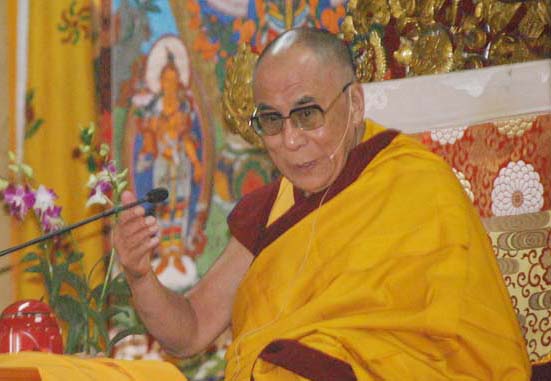Dharamsala, India: On 21 October, His Holiness the Dalai Lama started off the second day of his teaching on the Four Noble Truths with a two-hour question-and-answer session.
 Dharamsala, India: On 21 October, His Holiness the Dalai Lama started off the second day of his teaching on the Four Noble Truths with a two-hour question-and-answer session.
Dharamsala, India: On 21 October, His Holiness the Dalai Lama started off the second day of his teaching on the Four Noble Truths with a two-hour question-and-answer session. Tibet's spiritual leader fielded a variety of questions from the audience and covered a broad range of topics during these two hours, from the danger of adopting a new religion, to the benefits of animal birth control, to the need for non-sectarianism in modern Tibetan Buddhism.
He also discussed some practical and political implications of the Buddhist concept of interdependence and the practice of compassion.
One of the questions posed read, "In what way can Buddhist individual practice contribute to solving global problems like poverty and intractable conflict?"
His Holiness responded that, "More compassion and a sense of 'we' rather than 'they' can help solve these problems."
His Holiness recommended that when dealing with our enemy, we should develop a sense of compassion for them and keep in mind that they are also a human being with a right to overcome suffering. Furthermore, we should work for the well being of all sentient beings, rather than favoring the particular group we belong to. He expressed a firm belief that this approach would be very useful in even the most intractable conflicts, such as that in Israel-Palestine.
His Holiness also emphasized that it is very important to make a distinction between human beings and their harmful actions, advising that in conflict we should, "hate the action, not the actor." While we should apply a sense of compassion and nonviolence in dealing with our oppressor, we do not need to become a "yes-man" and cave in to any harmful demands or actions.
"Forgiveness and compassion toward your enemy does not mean you accept their unjust deed," he declared. In his case, this means that while he feels compassion toward Chinese officials, he will not accept their repression of Tibetan people.
His Holiness the Dalai Lama also distinguished between the Chinese government and its people, and mentioned that he has had fruitful meetings with many Chinese scholars. In fact, it is extremely important to dialogue with Chinese people, because they are the ones with the power to reform their government.


![Tibet has a rich history as a sovereign nation until the 1950s when it was invaded by China. [Photo: File]](/images/stories/Pics-2024/March/Tibet-Nation-1940s.jpg#joomlaImage://local-images/stories/Pics-2024/March/Tibet-Nation-1940s.jpg?width=1489&height=878)















